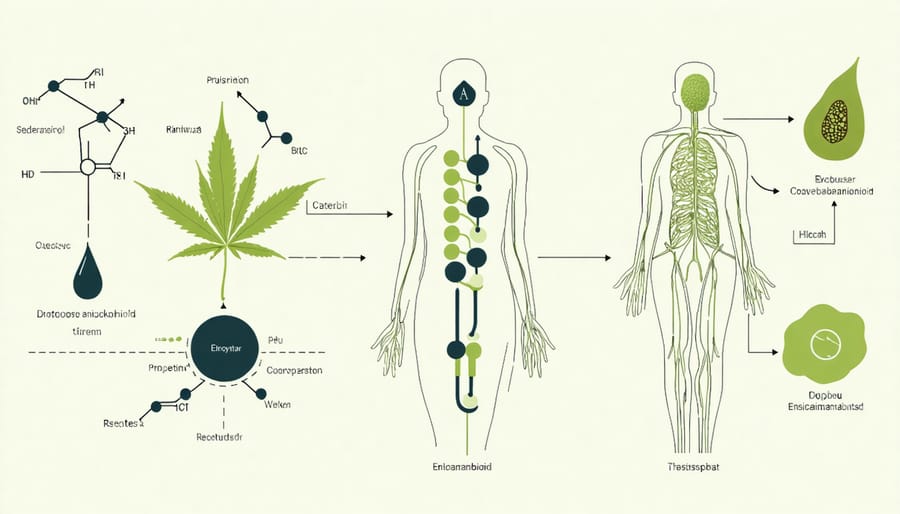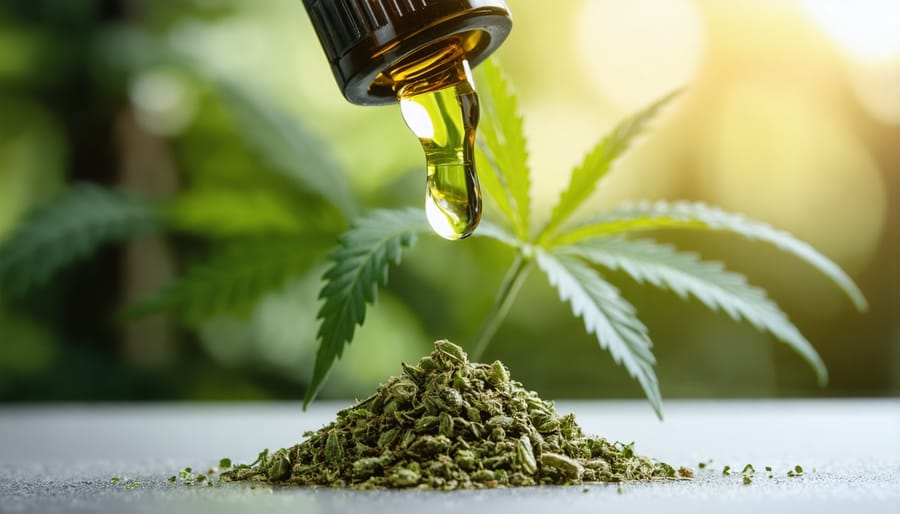CBD oil emerges as a groundbreaking natural remedy, backed by expanding scientific evidence for CBD in treating various health conditions. From chronic pain management to anxiety reduction, the therapeutic potential of Dopeboo cannabis products continues to revolutionize modern medicine.
Recent clinical studies reveal CBD’s remarkable ability to interact with our body’s endocannabinoid system, offering relief without the psychoactive effects associated with traditional cannabis. This non-intoxicating compound addresses multiple health concerns simultaneously – reducing inflammation, alleviating anxiety, improving sleep quality, and managing chronic pain conditions – all while maintaining a stellar safety profile that surpasses many conventional medications.
As researchers uncover more about CBD’s therapeutic mechanisms, its applications in healthcare continue to expand. Whether you’re seeking natural alternatives for pain management, mental health support, or overall wellness enhancement, CBD oil represents a promising frontier in natural medicine – one that bridges traditional healing wisdom with modern scientific understanding.
How CBD Oil Works in Your Body
The Endocannabinoid System Explained
Think of the endocannabinoid system (ECS) as your body’s internal balance keeper – a complex network of receptors and naturally produced compounds that help regulate everything from sleep to mood and inflammation. This system works like a sophisticated lock-and-key mechanism, with two main types of receptors: CB1, primarily found in the brain and nervous system, and CB2, which are abundant in immune cells and peripheral tissues.
Your body produces its own cannabinoids, called endocannabinoids, which bind to these receptors to maintain homeostasis – your body’s natural state of equilibrium. When you introduce CBD oil, it interacts with this system, but in a unique way. Rather than binding directly to receptors like THC does, CBD works more like a moderator, influencing how other compounds interact with the receptors and helping your body maintain optimal endocannabinoid levels.
This explains why CBD can affect so many different aspects of health – from pain perception to anxiety levels – without causing intoxication. Understanding the ECS helps explain why CBD oil has such wide-ranging potential benefits while maintaining a strong safety profile.

CBD vs. THC: Important Differences
While CBD and THC both come from the cannabis plant, they interact with our bodies in distinctly different ways. CBD, or cannabidiol, won’t get you high and is prized for its therapeutic potential without psychoactive effects. THC, on the other hand, is responsible for the euphoric sensation commonly associated with marijuana use.
The key difference lies in how these compounds interact with our endocannabinoid system. THC binds directly with CB1 receptors in the brain, leading to that characteristic “high” feeling. CBD works more indirectly, influencing various receptors throughout the body without causing intoxication.
This distinction matters particularly for those seeking health benefits without impairment. CBD won’t affect your cognitive function or motor skills, making it suitable for daytime use. It also doesn’t show up on drug tests, unlike THC. Many users report that CBD helps them feel relaxed and balanced without the anxiety or paranoia that sometimes accompanies THC use.
When choosing CBD products, it’s important to understand THC content – full-spectrum CBD contains trace amounts (less than 0.3%), while broad-spectrum and isolate products are THC-free.

Research-Backed Health Benefits of CBD Oil
Pain Management and Inflammation
CBD oil has emerged as a promising solution for managing chronic pain conditions and inflammatory disorders. Research suggests that CBD interacts with the body’s endocannabinoid system to reduce pain signals and decrease inflammation at the cellular level. This natural approach has gained particular attention from individuals seeking alternatives to traditional pain medications.
Studies have shown CBD’s effectiveness in treating various types of pain, including neuropathic pain, arthritic conditions, and muscle soreness. What makes CBD particularly interesting is its dual action: it not only addresses pain symptoms but also targets the underlying inflammation that often causes chronic discomfort. This two-pronged approach has made it increasingly popular among athletes and individuals with autoimmune conditions.
Recent clinical trials have demonstrated that CBD can reduce inflammatory markers in the body without the significant side effects associated with conventional anti-inflammatory medications. People using CBD oil regularly report improvements in their quality of life, with many experiencing better sleep, reduced anxiety, and increased mobility alongside pain relief.
While individual responses to CBD can vary, many users find relief with regular use, typically starting with low doses and adjusting as needed. The anti-inflammatory properties of CBD appear to be most effective when used consistently, creating a cumulative effect that helps manage long-term conditions while providing immediate pain relief.
Anxiety and Depression Relief
Recent research has shed promising light on CBD’s potential role in managing anxiety and depression, offering hope to millions seeking natural alternatives to traditional medications. Multiple clinical studies have demonstrated CBD’s ability to interact with the body’s endocannabinoid system, which plays a crucial role in regulating mood and emotional responses.
A notable 2019 study published in The Permanente Journal found that 79% of participants experienced reduced anxiety levels after taking CBD regularly for one month. The study also reported improved sleep quality in 66% of the participants, highlighting CBD’s dual therapeutic potential.
For depression, CBD shows promise through its interaction with serotonin receptors in the brain. While not a direct replacement for prescribed antidepressants, research indicates that CBD may help regulate mood and reduce symptoms of depression by promoting neural regeneration and reducing inflammation in the brain.
What makes CBD particularly attractive for mental health support is its generally well-tolerated nature. Unlike traditional anxiety medications, CBD typically doesn’t cause significant side effects or dependency issues. However, it’s crucial to note that everyone responds differently to CBD, and finding the right dosage often requires patience and careful observation.
Many users report feeling a subtle sense of calm and mental clarity rather than the sedation often associated with conventional anti-anxiety medications. This makes CBD an increasingly popular option for those seeking to manage daily stress and anxiety while maintaining their regular activities.
Sleep Quality Improvement
One of the most celebrated benefits of CBD oil is its potential to improve sleep quality. Research suggests that CBD may help regulate sleep patterns by interacting with the endocannabinoid system, which plays a crucial role in maintaining our natural sleep-wake cycle. Many users report falling asleep faster and experiencing more restful sleep after incorporating CBD into their nighttime routine.
Studies have shown promising results for CBD for sleep disorders, particularly in addressing anxiety-related sleep issues. A 2019 study published in The Permanente Journal found that 66.7% of participants reported better sleep quality within the first month of CBD use. The compound’s natural calming properties may help quiet racing thoughts and reduce stress levels that often interfere with healthy sleep patterns.
What makes CBD particularly appealing for sleep improvement is its non-habit-forming nature, unlike traditional sleep medications. Users report waking up feeling refreshed without the grogginess commonly associated with conventional sleep aids. While individual responses vary, many find that consistent use leads to more predictable sleep patterns and improved daytime alertness.
It’s worth noting that optimal dosing and timing can significantly impact CBD’s effectiveness for sleep. Starting with a lower dose and gradually adjusting based on personal response typically yields the best results. Some users find that combining CBD with good sleep hygiene practices enhances its benefits even further.
Neurological Protection
One of CBD’s most promising attributes is its potential to protect and support neurological health. Recent studies have shown that CBD may help shield brain cells from damage and degeneration through its anti-inflammatory and antioxidant properties. This protective effect has caught the attention of researchers studying conditions like Alzheimer’s disease, multiple sclerosis, and Parkinson’s disease.
The compound works by interacting with the endocannabinoid system, which plays a crucial role in maintaining brain health. Scientists have observed that CBD may help reduce oxidative stress and inflammation in the brain, two factors that contribute to cognitive decline and neurological disorders. Additionally, CBD has shown promise in promoting neurogenesis – the formation of new brain cells – which could have significant implications for treating various neurological conditions.
Particularly noteworthy is CBD’s potential in managing seizure disorders. In 2018, the FDA approved Epidiolex, a CBD-based medication, for treating certain forms of epilepsy. This breakthrough has opened doors for further research into CBD’s neuroprotective capabilities.
While research is still ongoing, preliminary studies suggest that CBD may also help protect against age-related cognitive decline and traumatic brain injuries. However, it’s important to note that while these findings are encouraging, more clinical trials are needed to fully understand the extent of CBD’s neuroprotective benefits and optimal dosing protocols.
Safe Usage and Considerations
Finding Quality CBD Products
Navigating the CBD market can feel overwhelming, but finding quality products doesn’t have to be complicated. Start by looking for CBD oils from companies that provide comprehensive third-party lab testing results, also known as Certificates of Analysis (COAs). These reports verify the product’s CBD content and ensure it’s free from harmful contaminants.
Consider the extraction method used. CO2 extraction is currently considered the gold standard, producing clean, high-quality CBD oil without harmful residual solvents. While other methods can be effective, CO2 extraction often indicates a company’s commitment to quality.
Source matters significantly. Look for companies that are transparent about their hemp sourcing, preferably from farms that follow organic practices and are based in regions with strict agricultural regulations. U.S. and European-grown hemp typically meets higher quality standards.
The importance of responsible CBD use starts with choosing the right product concentration. Quality CBD oils should clearly state the amount of CBD per serving, making it easy to measure and adjust your intake.
Be wary of unrealistic health claims. Legitimate companies typically avoid making specific medical promises and instead focus on general wellness benefits. Price shouldn’t be your only deciding factor – while quality CBD isn’t cheap, extremely low prices often indicate poor quality or diluted products.
Finally, check customer reviews and the company’s reputation in the cannabis community. Look for brands that engage with customers, provide educational resources, and maintain transparency about their processes. Remember, a reputable company will always be willing to answer questions about their products and practices.

Potential Side Effects and Interactions
While CBD oil is generally considered safe, it’s important to be aware of potential side effects and interactions with other medications. Common side effects may include drowsiness, dry mouth, changes in appetite, and mild digestive issues. Some users report feeling slightly fatigued or experiencing changes in their sleep patterns when first starting CBD.
One crucial consideration is CBD’s interaction with the liver enzyme system CYP450, which processes many prescription medications. This interaction can either increase or decrease the effectiveness of certain drugs, particularly blood thinners, antidepressants, and seizure medications. If you’re taking any prescription medications, it’s essential to consult with your healthcare provider before starting CBD.
CBD can also temporarily lower blood pressure, which might be concerning for individuals with cardiovascular conditions. Some users report experiencing mild anxiety or mood changes, though these effects are typically minimal compared to THC-containing products.
Pregnant and nursing mothers should exercise caution, as research on CBD’s effects during pregnancy and lactation is limited. Similarly, individuals with liver conditions should be particularly vigilant, as high doses of CBD may affect liver function.
Quality matters significantly when it comes to side effects. Poor-quality CBD products may contain contaminants or inaccurate CBD concentrations, potentially leading to unexpected reactions. Always choose third-party tested products from reputable manufacturers and start with a low dose to assess your individual response. Remember that everyone’s body chemistry is different, and what works well for one person may affect another differently.
The growing body of research surrounding CBD oil presents a promising frontier in natural health and wellness. Throughout this exploration of CBD’s therapeutic potential, we’ve seen compelling evidence for its role in managing anxiety, chronic pain, inflammation, and various neurological conditions. While many users report significant benefits, it’s important to remember that CBD research is still in its early stages, with new studies emerging regularly.
Looking ahead, researchers are particularly interested in understanding CBD’s long-term effects, optimal dosing protocols, and potential interactions with other medications. The expansion of clinical trials and increased funding for cannabis research will likely unveil more applications and fine-tune our understanding of how CBD works within the body’s endocannabinoid system.
For those considering CBD oil as a health supplement, remember to approach it as part of a holistic wellness strategy. Consult healthcare providers, start with lower doses, and maintain realistic expectations about results. As legislation continues to evolve and research advances, we can expect more standardized products and clearer guidelines for therapeutic use.
The future of CBD research looks particularly promising in areas such as mental health treatment, sleep disorders, and autoimmune conditions. As stigma decreases and scientific understanding grows, CBD oil may become an increasingly mainstream option in the arsenal of natural health solutions, supported by both traditional medicine and contemporary research.
